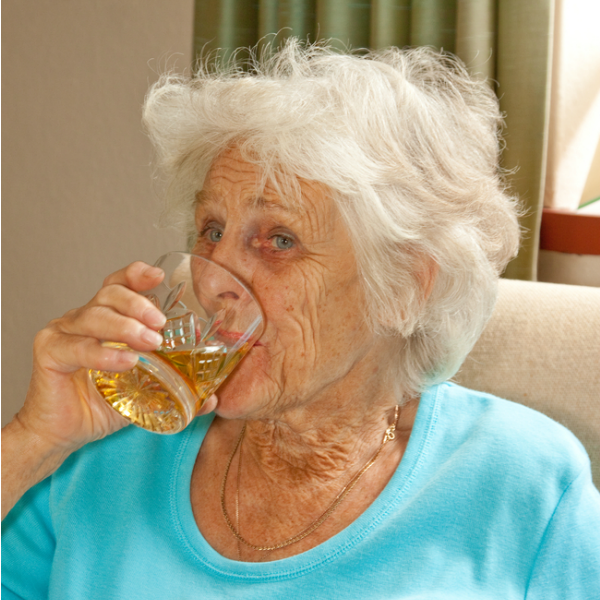How to Recognize Geriatric Substance Abuse
Alcohol and drug abuse, particularly prescription drugs, among those 60 and older, is one of the fastest-growing health problems in the United States.
Many consider it a mounting public health concern.

True Story
Ruth retired 12 years ago. Her husband of nearly 50 years died a few years back. Her children and their families live in other states. Many of her friends have died or have moved nearer their children. Some reside in an assisted living facility. Others are in nursing homes. She rarely sees them or even hears from them.
Ruth’s doctor has her on several medications for health issues associated with aging. Most days she remembers to take them.
She’s isolated and feels very alone. In the evening Ruth has a glass or two, sometimes a bottle, of wine to “help her sleep” and cope with all of these big life changes and the overwhelming feeling of loneliness.
Before going to bed, she takes aspirin for a headache.
Is Ruth abusing alcohol?
Could grandma really be an alcoholic?
Maybe.
Substance Abuse Facts
- While illicit drug use typically declines after young adulthood, nearly 1 million adults aged 65 and older live with a substance use disorder (SUD), as reported in 2018 data.1
- Alcohol is the most used drug among older adults. It is often used for physical and emotional pain.
- The total number of SUD admissions to treatment facilities between 2000 and 2012 differed slightly; the proportion of admissions of older adults increased from 3.4% to 7.0% during this time.2
- Little is known about the effects of alcohol and drugs on an aging brain.
- As one ages, physiological changes in the body lead to increased sensitivity and a reduced tolerance to drugs and alcohol. And, medical complications may interfere with the way alcohol or drugs are broken down in the body.
- Herbal remedies, dietary supplements and over-the-counter medications can interact with drugs and alcohol in unpredictable ways.
- Older adults metabolize substances more slowly. Therefore, their bodies and brains are more sensitive to drugs.3
- Elderly often unintentionally misuse medications. They take them too often, forget to take them or take the wrong amount.
- According to the National Council on Alcoholism and Drug Dependence (NCADD), widowers 75 and older make up the majority of people suffering from alcoholism in the USA. They use it to medicate their grief.
- Nearly 50 percent of nursing home residents have a problem with alcohol.4
- Older adults are hospitalized for alcohol-related problems as often as they are for heart attacks.5
- Doctors are often confused whether a patient is misusing substances or is showing symptoms of aging like dementia, frailty, lethargy, chronic health conditions or reactions to stressful, life-changing events in their patient’s lives. Many physicians do not screen for substance abuse. Instead, they focus on the more common medical problems of the aging.
Causes of Substance Abuse
Aging is not easy. Older adults, who struggle with the challenges of it, look for ways to self-medicate.
For many, retirement often means a loss of social connection and purpose. Children relocate and are busy with their own families and careers. Health issues become debilitating and disheartening. A lot of the things that once defined adult life are lost.
Causes of drug and alcohol abuse in older adults can include:
- Loss of a loved one. Many elderly people use drugs and alcohol to comfort themselves following a major loss.
- Loneliness. A trip to the local bar may be the only way seniors feel connected. They are isolated by circumstance. Maybe the children have moved away and do not remain in regular contact. Or, they’ve lost their spouse or best friend. They no longer have a daily routine since retirement. Alcohol and drugs help them feel less alone.
- Health challenges. These can come on like a blizzard. Mobility issues mean loss of independence. Vision challenges may affect one’s ability to drive and lead to social isolation. Cancer, strokes and heart problems make seniors feel hopeless. Health problems can feel overwhelming and drugs and alcohol allows one to escape from the rigors of them.
- Chronic Pain. It’s very common for those with chronic pain to become addicted to prescription drugs.
- Financial Challenges. This is a risk factor for substance abuse at any age but especially for the elderly who may not be prepared for medical and nursing home bills.
- Sleep Problems. Sleep can be a struggle for many. Maybe it’s caused by age, health problems, loss of a partner or purpose, family conflict, relocation, or anxiety. Doctors are often quick to prescribe medications to help people fall asleep. But certain sleep pills can be addictive. Some elderly choose to self-medicate with over-the-counter sleep aids, prescription painkillers or alcohol.
- Unintended Abuse. Memory challenges and cognitive decline make it hard for older adults to keep track of medications. They take them too often or in a larger dose than prescribed. It is common to inadvertently take medications incorrectly, increasing the risk of developing an addiction and dependence.
Signs and Symptoms

Substance abuse in the elderly is often hard to identify, especially if the person is always homebound.
Some of the signs of substance abuse mirror signs of aging, making it difficult to recognize if there is an issue, or its extent. Also, medications that many elderly take may mask or mimic substance abuse symptoms.
General health and mental conditions increase as one ages, creating the need for greater prescription drug usage. The Psychiatric Times estimates that a quarter of all prescription drugs in the USA are sold to the elderly, and close to 11 percent of this group may abuse these medications.
Those with abuse issues feel ashamed and try to hide their addiction.
Their adult children ignore the issue, disbelieving mom or dad could be an alcoholic or drug addict at this point in their adult life.
Elder substance abuse then nearly becomes an invisible problem.
Experts say these are the most common indicators of substance abuse in the elderly:
- Secretive and solitary drinking habits
- Slurred speech and repeated falls
- Sudden and drastic change in appearance and hygiene
- Hostile and aggressive behaviors, irritability
- Unexplained burns and bruises
- Drinking despite warnings on prescription containers
- Onset of depression or anxiety; panic attacks
- Fatigue or weakness; sleep problems or sleeping during the day
- Memory loss, confusion and forgetfulness, especially of date, time and place
- Giving up interests and hobbies once enjoyed
- Chronic health complaints not linked to obvious health problems
- Loss of appetite or changes in eating habits
- Losing touch with loved ones
- Unable to complete activities of daily living (ADLs)
Consequences
Drugs and alcohol worsen lung and heart problems and exasperate memory issues and mood disorders.
Alcohol abuse puts older people at greater risk for diabetes, high blood pressure, congestive heart failure, liver and bone problems and memory and mood disorders.
Impaired judgment, reaction time and lack of coordination resulting from drug and alcohol use often result in accidents like falls and vehicular crashes.
It leads to greater isolation. The one abusing substances self isolates or (s)he offends family and friends, causing greater isolation.
What to Do
Little research exists on the best models of care for older adults abusing substances.
Research that is available shows that even a brief intervention by a physician or other healthcare provider can reduce drinking levels.
If you are concerned about a loved one who may be suffering from elderly alcoholism or addiction, talk to them about their habits. Be prepared. They may be embarrassed by their problems and refuse to admit they have an issue. Because of the stigma of addiction, they might believe it’s a private matter and not be willing to openly talk to you about it.
Since many older adults do not recognize the need for addiction treatment, an intervention from family, treatment professionals and/or medical professionals is vital.
Research does show
- Treatment with others their age is most effective.
- Older adults are compliant with treatment and have better outcomes than younger addicts.
- Longer duration of care for this population results in better outcomes.
- A focus on re-building support networks is vital to preventing relapse.
- Since detox and withdrawal are very hard on the body, elderly addicts with serious medical conditions are best treated in a local hospital before transferring to a treatment center.
If you or a loved one is struggling with substance abuse and needs help, please contact us. Contact – Craft Lifestyle Management (craftlifestylemgt.com)
We are here to listen in a non-judgmental way and to guide you to the best treatment available.
SHARE this post.
You never know who may be helped by doing so.
© October 2021 Craft LifeStyle Management.
All Rights Reserved.

Can I speak to your organization or group? Contact me. Contact – Craft Lifestyle Management (craftlifestylemgt.com)
References
- Substance Abuse and Mental Health Services Administration. (2019). Results from the 2018 National Survey on Drug Use and Health: Detailed tables. Rockville, MD: Center for Behavioral Health Statistics and Quality, Substance Abuse and Mental Health Services Administration. Retrieved from https://www.samhsa.gov/data/
- Chatre S, Cook R, Mallik E et al. Trends in substance use admissions among older adults. BMC Health Services Research. 2017; 584(17). doi: https://doi.org/10.1186/s12913-017-2538-z
- Colliver JD, Compton WM, Gfroerer JC, Condon T. Projecting drug use among aging baby boomers in 2020. Annals of Epidemiology. 2006; 16(4): 257–265.
- National Council on Alcoholism and Drug Dependence. (2015). Alcohol, Drug Dependence and Seniors.
- National Council on Alcoholism and Drug Dependence. (2015). Alcohol, Drug Dependence and Seniors.
More Information
Substance Abuse in Aging and Elderly Adults (psychiatrictimes.com)
Facts About Aging and Alcohol | National Institute on Aging (nih.gov)
Substance Use Treatment for Older Adults | SAMHSA
A Guide to Drug Abuse & Addiction Recovery for the Elderly
Substance Use in Older Adults DrugFacts | National Institute on Drug Abuse (NIDA)
